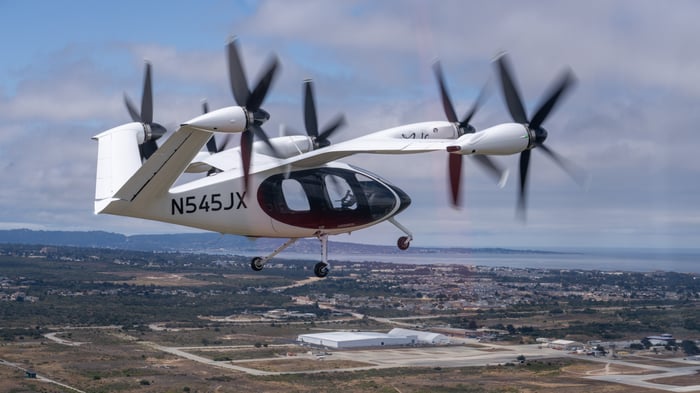Could Buying Joby Aviation Stock Today Set You Up for Life?
Key Points
Joby Aviation's business model differs significantly from that of its peers.
There's reason to believe its vertically integrated strategy will win out.
The upside potential is significant; provided the certification process goes smoothly, Joby has a big future.
The electric vertical take-off and landing (eVTOL) market is crowded, but that doesn't mean it's a winner-takes-all scenario. Different companies have different business models with varying risks and rewards, and Joby Aviation (NYSE: JOBY) is arguably the one with the most reward and also one that's reducing its risk the most in 2025. Is it enough to make it a stock that could set investors up for life? Here's the lowdown.
What makes Joby Aviation different
It's always interesting to compare competitors across a growth industry, and doing so with Joby's peer Archer Aviation (NYSE: ACHR) makes for a fascinating comparison. The first conclusion is that they have significantly different models. The second is that the nature of their models allows for more than enough room for both in the market, and the third is that Joby Aviation is making real progress in de-risking the elements of its business that are subject to greater market uncertainty.
Where to invest $1,000 right now? Our analyst team just revealed what they believe are the 10 best stocks to buy right now. Learn More »
In a nutshell, you can think of Joby Aviation as a "go it alone" player in the industry, backed by a heavyweight manufacturing partner in Toyota, as well as other investors such as Uber and Delta Air Lines. Its business model is different from Archer's and the rest of the industry in two key ways:
- Joby Aviation doesn't plan to sell its aircraft and prefers to develop much of its technology in-house, having its own powertrain and electronics manufacturing facility in California.
- As quoted from its Securities and Exchange Commission (SEC) filings, Joby plans to "own and operate our aircraft ourselves, building a vertically integrated transportation company that will deliver transportation services to customers."
Both points are crucial to understanding the investment case.
Joby's in-house development
Archer, along with other eVTOL companies such as Germany's Lilium and the U.K.'s Vertical Aerospace, makes no secret of the fact that it has leading aerospace and automotive companies as partners in providing solutions. The advantage of heavy integration with established partners in developing technology is a simplified and less risky process, which, theoretically, leads to earlier certification.

Image source: Getty Images.
For example, Archer partners with Honeywell for actuators and climate systems, Hexcel for advanced composite materials, Safran for avionics, and Stellantis (also a key investor). Honeywell is a key strategic technology partner of Vertical Aerospace and partners with European aerospace companies GKN and Leonardo.
Lilium partners with GE Aerospace in flight data management and Honeywell (also an investor) for flight control, avionics, and propulsion unit sensors.
As such, Joby's more "go it alone" approach could be deemed more risky. However, it has received significant investment (up to $894 million) from a manufacturing heavyweight, Toyota. Moreover, the Japanese giant is assisting in improving Joby's manufacturing processes and optimizing design.
A vertically integrated transportation company
Here again, Joby is different. It doesn't want to sell its aircraft; instead, it wants to handle the commercialization of transportation services itself. Again, this is a more risky business model, as it implies commercial business expertise in addition to research & development and manufacturing expertise. It's somewhat akin to Boeing or Airbus deciding to operate an airline.
On the other hand, there's a reason why Uber has invested $125 million in Joby so far: the obvious potential to integrate their services. Similarly, Delta Air Lines is investing up to $200 million in Joby to transport passengers to airports. With Delta increasingly focusing on premium travelers and looking to offer experiences that engender loyalty, the Joby tie-in is a significant plus.

Image source: Joby Aviation.
Can Joby Aviation be a life-changing investment?
Given the current trends in the global economy, whereby technology is enabling fundamental shifts in how industrial and transportation companies operate (think Tesla selling direct or Uber not needing to own cars), Joby's business model makes perfect sense and has the potential to create more value for shareholders over the long term.
Meanwhile, while its peers are working with leading aerospace companies, Toyota is a formidable manufacturing entity and partner, and the Toyota Production System is the precursor to all the lean manufacturing practices successfully implemented by GE Aerospace and many others.
There are no guarantees in nascent technology fields such as eVTOL, and diversification is key when investing in growth stocks. Still, Joby Aviation is a strong candidate for an investment that could set you up for life.
Should you invest $1,000 in Joby Aviation right now?
Before you buy stock in Joby Aviation, consider this:
The Motley Fool Stock Advisor analyst team just identified what they believe are the 10 best stocks for investors to buy now… and Joby Aviation wasn’t one of them. The 10 stocks that made the cut could produce monster returns in the coming years.
Consider when Netflix made this list on December 17, 2004... if you invested $1,000 at the time of our recommendation, you’d have $636,628!* Or when Nvidia made this list on April 15, 2005... if you invested $1,000 at the time of our recommendation, you’d have $1,063,471!*
Now, it’s worth noting Stock Advisor’s total average return is 1,041% — a market-crushing outperformance compared to 183% for the S&P 500. Don’t miss out on the latest top 10 list, available when you join Stock Advisor.
*Stock Advisor returns as of July 21, 2025
Lee Samaha has no position in any of the stocks mentioned. The Motley Fool has positions in and recommends Uber Technologies. The Motley Fool recommends Delta Air Lines, GE Aerospace, Hexcel, and Stellantis. The Motley Fool has a disclosure policy.








